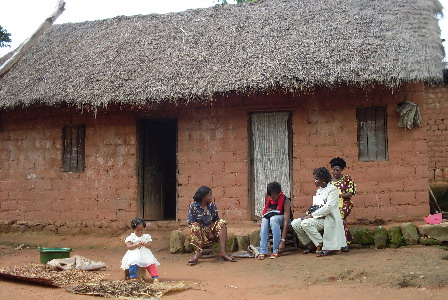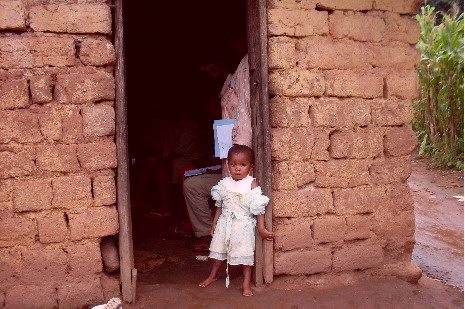Survey on Very Vulnerable Families in Wum
Description
In 2009, IDF undertook a survey on vulnerable families in Wum Council: Kesu, Zongekwo, Zongefu, Bangwe and Bu villages. This project was carried out over 3 months and targeted 423 households. The purpose of this project was to determine whether very poor families are more vulnerable to subjecting their children to child trafficking and child labor.
A family in Wum who participated in the survey
Project Context
One of the focuses of the International Labor Organization (ILO) is child trafficking for labor exploitation. Given the special status of children in development strategies, the ILO seeks to help families which are exposed to various forms of vulnerabilities to avoid having them succumb to child trafficking and labor. The ILO’s approach supports the development process by highlighting the promotion of social justice through access to decent and productive work under conditions of freedom, equity, security and dignity. The objective of the project was to promote decent jobs as a means of fighting against poverty within communities vulnerable to child trafficking in Cameroon. Very poor families were targeted to be strengthened and empowered with entrepreneurial skills so that they can in turn take care of the practical need of their children.
Interviewing families in Wum
Activities
IDF undertook the following activities in its role of consultant:- Training of surveyors and facilitators and the preparation of data collection
- Collecting data through administering questionnaires and interviews with inhabitants of the targeted communities
- Data cleaning and inputting
- Analyzing the data and preparing a final report

A child in Wum
Results and Impacts
The results from the research indicated that inhabitants are aware of the danger of the phenomenon and are ready to join the fight. Parents are aware of the importance of the education and are ready to sent their children to school if there have the means. It was evident that traffickers are stigmatised in the communities. The population felt that the Government by supporting them, cares about their well being. As a result of the project, from 2007 to 2009 IDF with the help of the government supported the education needs of 1290 children.Difficulties Faced
- IDF always has difficulty in obtaining funds for this event which results in a shortage of materials such as handouts and t-shirts.
- Late approval from our partners sometimes results in some activities being cancelled.
- Having events in both Wum and Bamenda requires a private vehicle and additional volunteers in order to transport some of the large signboards to Wum.
Lessons Learned
- Some people believe that children should work
- Children are seen as an important part of the labor force in subsistence farming communities
- Family size is large because of uncontrolled birth, polygamy and death.
- Birth registration is not seen as a right but as a means to attend official exams.
Way Forward/Recommendations
- The parents need to be educated on the rights of the child and birth control
- Potential for micro credit in this area to increase economic potential
- Educational support is needed for the most desperate cases
- The families should be educated on the importance of birth registration